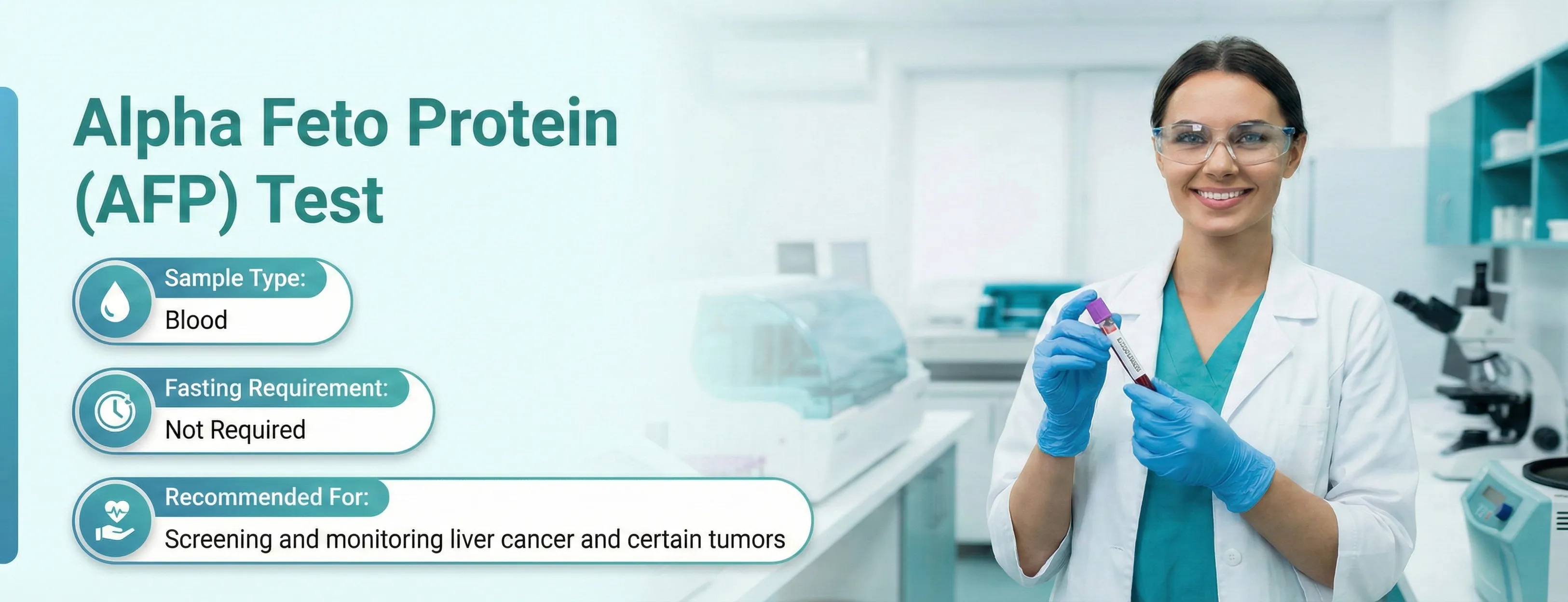109+ orders placed in your location
100% NABL & ISO Certified Lab • 100% Accurate Reports
Alpha Feto Protein (AFP) Test
Serum AFP, AFP Maternal, Maternal Serum AFP, Alpha-Fetoprotein-L3
- SummaryThe Alpha Feto Protein (AFP) test measures the level of AFP in the blood, a protein normally produced by the fetal liver. In adults, it helps detect and monitor liver cancer, testicular/ovarian tumours, and certain birth defects during pregnancy. The test is performed using a blood sample, and fasting is not required.Read more
- Reports Within16 HrsView Sample Report100% NABL & ISO Certified Labs
- SampleBlood
- AgeAll Age Group
- GenderMale and Female
- FastingNot Required
PharmEasy Promises
Know More About The Test
A quick info on Alpha Feto Protein (AFP) Test
Overview
The Alpha-Fetoprotein test is a test used to detect levels of Alpha-Fetoprotein in the sample. This test is usually a part of the triple-screen or quad-screen test conducted during the second trimester of pregnancy.
Alpha-Fetoprotein (AFP) is a protein that is produced by the liver of the developing foetus. During pregnancy, this Alpha-Fetoprotein passes through the placenta into the maternal blood. Therefore, high or low levels of AFP in the maternal blood indicate a congenital disability in the foetus.
The congenital disabilities that are detected with the Alpha-Fetoprotein test are as follows -
- Neural tube defect - A severe medical condition that causes abnormal growth and development of the baby's brain and/or spine.
- Down syndrome - A genetic disorder that can cause intellectual disabilities and delays in the baby’s development.
AFP levels are high when the baby is born and continue to fall to very levels by the time the baby turns 1. Alpha-Fetoprotein levels drop drastically in healthy adults.
The Alpha-Fetoprotein test for adults helps measure the levels of AFP in their blood. This test acts as a tumour marker for various cancers like testicular cancer, ovarian cancer, and non-cancerous conditions like liver cirrhosis and hepatitis. Tumour markers are substances that your body cells produce in response to cancer in the body. High levels of AFP indicate the presence of cancer. The Alpha-Fetoprotein test cannot be used as a diagnostic test for cancer. But it helps diagnose cancer when combined with other specific diagnostic tests. This test also helps monitor cancer treatment effectiveness and check for any cancer relapse after treatment is over.
Risk Assessment
Neural tube defects, Down syndrome, Liver cancer, Testicular cancer, Ovarian cancer, Chronic liver diseases like hepatitis & cirrhosis
What does this test detect?
The Alpha-Fetoprotein test measures the levels of Alpha-Fetoprotein in the blood. AFP is a protein that is produced by the foetus in the womb. After being born, the AFP levels are the highest in the newborn baby. The AFP levels keep decreasing as the baby turns one year of age. Adults have low levels of AFP in their blood.
Indications for AFP Test
The Alpha-Fetoprotein test is prescribed for pregnant women during the second trimester of pregnancy. This test is to detect any congenital disabilities present in the unborn foetus. For accurate results, get tested during the 16th to 18th week of pregnancy. Hence you must know your due date correctly to calculate your exact period for taking the test.
The Alpha-Fetoprotein test is usually performed as part of the quad screening test. These tests include:
- Testing your HCG levels - Your placenta produces human chorionic gonadotropin.
- Testing your estriol levels - Estriol is produced by your placenta and the baby's liver.
- Testing your inhibin A levels - Inhibin A is produced by your placenta.
The Alpha-Fetoprotein test is prescribed for women who are at high risk of delivering children with congenital disabilities. These women are -
- Someone who is 35 years or older.
- Someone with a family history or a history of congenital disabilities.
- Someone who has used harmful medicines or drugs during their pregnancies.
- Someone who has diabetes.
The Alpha-Fetoprotein test is also prescribed in adults when -
- Your doctor suspects that you have liver cancer, ovarian cancer in females or testicular cancer in males. Your doctor may suspect cancer if they feel a lump in your abdomen or any other part of your body during a clinical examination. If specific scans or x-rays show the presence of possible tumours, your doctor may ask for the Alpha-Fetoprotein test.
- You have been diagnosed with liver cancer, testicular cancer, or ovarian cancer and are under treatment for the same. The Alpha-Fetoprotein test helps monitor the effectiveness of the therapy.
- You need to monitor for cancer recurrence or relapse.
- You need to follow up for certain conditions like chronic hepatitis or liver cirrhosis.
How frequently should you take this test?
Based on your symptoms, your doctor may repeat the Alpha-Fetoprotein test.
- The test is first conducted around the 14th and 22nd week of pregnancy to check for congenital disabilities.
- When the Alpha-Fetoprotein test is used as a tumour marker, then the test is repeated every 3-6 months to check for the prognosis of cancer treatment.
Test Preparation
The Alpha-Fetoprotein test takes a sample of your blood for testing. In pregnant women, the Alpha-Fetoprotein test is conducted by taking a blood sample, a urine sample, or even a sample of the amniotic fluid. In adults, when the Alpha-Fetoprotein test is used as a tumour marker, the test requires a blood sample.
Before the Test
This test does not require any preparation from your end. However, if this test is done while pregnant, you need to know your due date properly. The idea is to calculate the period between the 16th and 18th week of pregnancy for accurate results. Also, if this test is being done as a tumour marker, you need to inform your physician about your symptoms.
During the Test
It is a simple blood test that will get over in 5-10 minutes. You do not need to prepare for the test in any way.
After the Test
There are no restrictions after the Alpha-Fetoprotein test. You can resume normal activity.
Parameters
The Alpha-Fetoprotein test report detects the Alpha-Fetoprotein levels in the blood, urine, or amniotic fluid sample.
Interpretation of the Alpha-Fetoprotein Test Results
The Alpha-Fetoprotein test results show Alpha-Fetoprotein levels in the blood or urine sample for pregnant women and the blood sample for adults. This test only helps screen or detect the presence of a congenital disability in the foetus and cancers in adults. It cannot diagnose the type of congenital disability and cancers.
Ranges
The normal range of AFP levels in the Alpha-Fetoprotein test results are as follows -
AFP levels in | Normal Range |
Men and non-pregnant women | 0 ng/ml - 40 ng/ml |
Pregnant women (15th week to 20th week) | 10 ng/ml - 150 ng/ml |
The normal values and reference ranges of the test may vary from lab to lab. Please refer to the ranges mentioned in the report and consult a doctor to understand the interpretation of lab reports.
Test Result Interpretation
If you have high levels of AFP in the Alpha-Fetoprotein test result during pregnancy -
- Your baby might have a neural tube defect known as spina bifida. It is a condition where the spine's bones do not close around the spinal cord like they usually should.
- Your baby might have anencephaly. It is a condition where the brain does not develop properly.
- Your baby might have omphalocele. It is a condition where the abdominal wall of the baby has not developed. The infant's internal organs, like the liver, intestines, and stomach, stick outside the belly via the belly button.
- Your baby might have gastroschisis. It is a condition where the abdominal wall of the baby has not formed correctly. The infant's internal organs like the liver, stomach, and intestines stick out of a hole next to the belly button.
If you have low levels of AFP in the Alpha-Fetoprotein test result during pregnancy -
- Your baby might have a genetic disorder known as Down Syndrome. It is a condition that causes intellectual and developmental issues in your newborn baby.
False-positive Alpha-Fetoprotein test results during pregnancy can be due to -
- Wrong calculation of the due date. You did not test during the 16th to 18th week of your pregnancy, and AFP levels do not match the normal range.
- You have multiple babies developing in your womb. Twins or triplets mean double or triple the amount of AFP being produced than normal.
- Gestational diabetes.
- Cigarette smoking.
If you have high levels of AFP in the Alpha-Fetoprotein test result as an adult -
- You probably have cancers like liver cancer, ovarian cancer in women, testicular cancer (germ cell tumours) in men.
- You could also have other cancers like stomach cancer, lung cancer, colon cancer, breast cancer, or lymphoma.
- You might have liver cirrhosis or hepatitis.
- You might have ataxia-telangiectasia - a rare inherited disorder that affects your immune system and nervous system.
If you are under cancer treatment and the Alpha-Fetoprotein test results are used for monitoring the progress, the test results may be as follows -
- AFP levels are increasing - Cancer is spreading and/or the treatment is not working.
- AFP levels are decreasing - Cancer treatment is working.
- AFP levels have not changed - Cancer is stable. Treatment may or may not be working.
- AFP levels decreased initially and then increased - Cancer was treated fully at first but is now returning or relapsing.
Consult your doctor to interpret your results correctly and get the right kind of treatment.
The Alpha-Fetoprotein Test cannot tell you -
- The type of congenital disability or genetic disorder that your unborn baby is suffering.
- The type of cancer you are suffering from as an adult.
Risks and Limitations
The Alpha-Fetoprotein test, a frequently conducted blood and urine test, has minimal risks of complications. Seek advice from your doctor if you notice:
- Continuous bleeding from the site where the blood was drawn
- Inflammation, swelling, or discomfort at the site
Limitations of the test
- Errors due to faulty equipment or mistakes made by the phlebotomist
- The possibility of misreading certain indicators, resulting in an incorrect diagnosis and report.
Was This Test Information Helpful?
Please rate your experience
References
People Also Ask
What happens if AFP is high?
What does an abnormal AFP test mean?
What happens if an AFP test is positive?
Have any doubts? Ask us.
Ask us anything about the Alpha Feto Protein (AFP) Test to understand it better
We provide trusted, expert-curated health content to support better awareness,prevention, and care.
Backed by experienced doctors, medical experts, and strict editorial standards.


